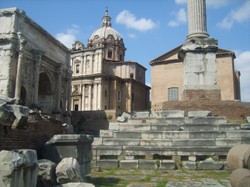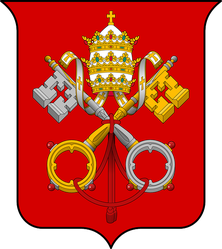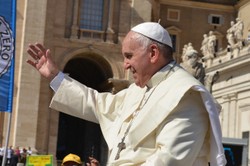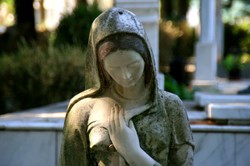One of the issues that causes controversy in our time is the refusal of the Catholic Church to ordain women to the priesthood, and therefore to the episcopate, which is only open to ordained priests. But the ministry is threefold, consisting of bishops, priests and deacons, and while the diaconate was until recently seen as only the last step to the priesthood, it is a separate ministry established by the Apostles in the New Testament. There were women deacons in the early church, but they fell out of use.

Yes to deaconesses
by frankbeswick
Pope Francis has made a possible first step in the opening of the Catholic ministry to women.
Deacons and Deaconesses
I was eighteen and a student at theological college, and as occasionally happened I sat at the superior's table at dinner. I have forgotten the full conversation that we enjoyed, but the issue of women priests was raised. He did not believe in them and came up with the objection that providing training facilities in what are male-only institutions would be difficult. I thought that the time that this was a mere administrative objection and not insuperable; but then I said to him, "Surely, they had women deacons in the early church?"
He replied, "Yes but all they did was arrange the flowers on the altar."
I had not the theological knowledge then to object, but you know sometimes that there is more to an issue, it's a gut feeling, so I kept my counsel and thought about it. But Pope Francis' recent decision to establish a committee to study the ordination of women to the diaconate has opened up the issue. There are some who regard it as the slippery slope to women priests, for this was the path taken by the Anglicans [Episcopalians] whereas others see it as opening a door that has been too long closed. While there is a case for saying that both sides are right, the diaconate is a separate ministry and we could have a women's diaconate without there being any implications for the possibility of women priests..
So what is a deacon? In Acts of the Apostles chapter 6 we read the tale of how the early church appointed seven males to perform the role of distributing bread to the needy so that the apostles could concentrate on preaching and teaching. The word diakonos denotes a servant, but not a slave [doulos/a.] But the diaconate took on a life of its own, and in the early church deacons soon developed a role in the church's liturgy,formal public worship. They performed baptisms, and here is where deaconesses came into their own. Baptism was performed naked by immersion in a pool, so to preserve women's modesty deaconesses baptized women. But it is unclear that they did anything else, but sadly documents are often unclear and few and far between. However, by the time that Constantine made Christianity the favoured religion of the empire, women deacons were no longer wanted and the ministry of women faded out. Since that time supporters of the status quo have performed theological acrobatics to find reasons not to have women in the ministry.
But why did they fall out of favour? Easy to answer, pure sexism! The church was obtaining a role in the power structure of Roman society, and, female readers, if you think that modern society is sexist, ancient Rome was worse. Romans simply could not understand the idea that women could exercise authority, especially not over a male. so the idea of women priests and deacons was completely out of their mindset. So for centuries now Catholicism has inherited an authority system corrupted by the values of ancient Rome. Some think that it is time to put right this situation to bring the church closer to what God would want it to be.
Modern Roles
A few week ago I attended the ordination in which a young deacon was ordained a priest. For most young males the diaconate is the last step to the priesthood. But there are permanent deacons in the church, all male at the moment, who perform many tasks that a priest does. A deacon cannot hear confessions or celebrate mass, for this requires priestly ordination, but he can preach, read the gospel at mass and distribute communion, and also baptize. Deacons do much pastoral work in the church, visiting sick people and old people, etc, and maybe doing catechesis, teaching the faith to the young.
But the ministry of lay people has been growing in the church, and many now read the scriptures at mass, as I do, though as a layman I do not read the gospel. which is reserved to the priest or deacon. Lay people give out communion, though they are not authorized to consecrate bread and wine. They also do charitable work and catechesis. The lay people who do this are both men and women. So it seems that there is much that deacons do that is already done by women. In emergency any Christian can administer baptism. Lay baptism involves the simple rite with water, but the full service involves anointing, but if women can do the essential bit, the pouring of water on the head, why can they not do the extras? It does not make sense.
Then we come to preaching. Certain religious groups do not allow women to preach. But the Catholic Church has never had a complete ban on this. The rule for preachers in the Catholic Church is that to preach in a diocese they must have the authorization of the bishop, who must satisfy himself of their wisdom, holiness and general sanity, in other words whether they are fit to be allowed in front of a congregation.There is a good reason for this, because in eleventh century Europe rogue preachers stirred up mobs against Jews and caused serious difficulties for both state and church who had to prevent them, so the Lateran Councils placed restrictions on who is allowed to preach in the formal liturgy of the church. This was a good ruling and one that no good Catholic should contravene,as it prevents cranks and evil people hijacking the service to their ends. This does not prevent lay Catholics from giving talk at informal services, but the liturgy of the Church is strictly controlled for the benefit and safety of all.
The preacher should be a person who shares his wisdom and holiness with the congregation. but are we to say that women are incapable of the holiness and wisdom required to preach, or are they incapable of communicating well enough? Only a sexist harking back to the neanderthal period would think that this was so [but I think that my metaphor is being unfair to neanderthals.] Sorry cavemen! No serious thinker would deem women lacking in the intelligence required to preach.
If lay people, including women, are currently performing roles in the church done by deacons,there is no reason to withhold the diaconate from women. There are many women longing to join the ministry and the diaconate is the first step. It is not necessarily the door to women priests, but it could be and I believe that it should be.
Catholics believe that a longing to join the ministry properly and thoughtfully reflected on and considered is a sign that God may be calling you to the ministry. Well, he certainly seems to be calling women in other churches, so why not those in the Catholic Church.Often humans obstruct God's will, and I fear that this is what traditionalists in the church are doing.
Anyone in the ministry represents Christ, but those who make the claim that Christ was a male forget that while the historic Jesus was biological male, the risen Christ has transcended masculinity and femininity, so Christ cannot be exclusively be represented by males. Women can represent Christ as well as men can and should be allowed to be ordained. Deaconesses are just a start.
You might also like
Conclave: a reviewConclave is a film which covers the secretive and fascinating process of el...
Hope: a reviewHope is the autobiography of Pope Francis detailing his life from early child...
Adrienne von Speyr a life on the edge of heavenSwiss convert to Catholicism, doctor, step mother and mystic Adrienne von Spe...








 TheThousand Year Gardenon 11/26/2025
TheThousand Year Gardenon 11/26/2025
 Women of the Gospelson 10/11/2025
Women of the Gospelson 10/11/2025
 Religious Gardenson 08/25/2025
Religious Gardenson 08/25/2025
 Doctor of the Church: John Henry Newmanon 08/03/2025
Doctor of the Church: John Henry Newmanon 08/03/2025




Comments
He must have respected Mary. Not only was she his mother, butbshevisbthevark of the covenant, god's chosen.
Thank you for your comment below in answer to my previous observation and question.
Perhaps the water into wine episode also indicates to us Jesus Christ's belief in what Our Lady Mary said.
Might it manifest how He respected her opinions as well as her facts, such as the latter about his birth?
Maybe she sensed that the host and bride were in need maybe God worked through her. Beyond that I cannot say.
Thank you for your comment below in answer to my previous observation and question.
The water into wine causes me to consider another concern.
Why is it that Our Lady Mary knew that her son's time had come even as He knew it not?
I donnot see anything problematic in the use ofbthe term.
Thank you for your comment below in answer to my previous observation and question.
Addressing His mother as "woman" always causes me to consider non-respectful and respectful forms of calling someone close and not close.
Is "woman" invoked a bit impatiently because "my time is not yet come [so why interrogate me so]" or is it not at all problematic?
The traditional translation is woman.
Thank you for your comment in answer to my previous observation and question.
Online sources variously translate Jesus Christ's telling Our Lady Mary that He thinks that it is not time for His transforming water into wine as "Mother, my hour is not yet come" and "Woman, my hour is not yet come."
Which one would be faithfuller to the original text?
Certainly. She was known in the Christian community as the Lady Mary. I think that her role in the Christian community would have been aiding devotikn to Jesus.
Thank you for your comment below on Jan. 21, 2021, in answer to my previous-day observation and question.
Jesus Christ had men and women followers.
Our Lady Mary may be called a follower also, correct?
Might she have had any responsibilities?